- Home
- Brian Falkner
Brain Jack Page 9
Brain Jack Read online
Page 9
“I was born in Los Angeles,” Dodge said, and seeing Sam’s questioning look, added, “But I mainly grew up in London.”
“So how’d they catch you?”
Dodge winked and tapped the side of his nose. “More than my life’s worth to tell you, Sonny Jim.”
Sam looked at Kiwi, who shook his head. “I’ve been trying to get it out of him since I’ve been here.”
Sam shrugged. “And you, Vienna?”
There was an uncomfortable silence, and then she dismissed him with a glance and shut her eyes, turning her face to the sun.
Kiwi gave Sam a small shake of the head. Don’t bother asking. “How did you get into hacking?” he asked.
“Well …” Sam hesitated. “When I was younger, we couldn’t really afford a computer, but I got a part-time job at a computer company, helping out in the repair section. We’d often get computers in with some kind of fault that meant they had to be replaced. But usually most of the computer was okay. So I’d salvage any parts that were worth keeping before chucking the rest in a Dumpster.
“Eventually I got enough spare parts to build an entire computer at home. I hot-wired the neighbor’s broadband connection to get Internet access, and it kind of all grew from there.”
“How old were you?” Dodge asked. “When you did all this?”
“Twelve,” Sam said.
There was a stunned silence from the others, which Vienna broke by saying, “Had to happen, Dodge. We finally found a bigger geek than you.”
“So what’s with the doorbell thing? At the White House,” Sam asked.
“We just do that to freak people out.” Dodge grinned.
“It works,” Sam said.
“Now go on over and introduce yourself to Miss Congeniality before she starts to think you’re a numb-nuts,” Dodge said.
“Yeah, yeah, soon,” Sam said, not moving. “Tell me more. Is there anywhere we can’t go? Anywhere off-limits?”
“Not much. Some financial stuff. CIA, of course. Some classified government files,” Dodge said, rolling over onto his stomach and resting his head on his hands.
“Where they keep the answers to all the big questions,” Kiwi said.
“JFK, Roswell, Vegas, stuff like that,” Dodge said.
Sam sat up on the lounge chair and looked over with sudden interest. The assassination of JFK last century was still a cause for speculation and conspiracy theory, even now; the purported alien-spaceship crash at Roswell was regarded as a joke by some and as gospel by others; while Vegas was often described as the world’s biggest unsolved murder.
“Serious?” Sam said. “And you can’t get in?”
“I said we weren’t allowed to. I didn’t say we weren’t capable,” Dodge said.
“Leave it alone, Dodge,” Vienna said. “He’s an egg.”
Dodge leaned toward Sam and spoke in a low voice. “Do you really want to know who actually killed JFK?”
“Yeah, of course. Doesn’t everyone?”
“Not who you’d think,” Dodge said enigmatically.
Sam began, “But—”
“Whatever you’ve read, whatever you’ve imagined, you’re not even close,” Dodge cut him off. “Want to know the truth about Roswell?”
“Hell, yeah!”
“Never happened. No spaceship, no dead aliens, nothing. It was a cover-up, all right, but not for a crashed UFO. That was just the diversion, to draw attention away from what was really going on, which is even harder to believe.”
“What—”
“And Vegas …”
It was strange, the names that were given to major tragedies, Sam thought. The World Trade Center disaster was always known by the date, 9/11, while the explosion three years earlier that had left a radioactive scar on the desert where Las Vegas used to be was known simply as Vegas.
“You want to know who set off that warhead and turned the place into a nuclear crap-hole?” Dodge asked.
“Yeah.”
“So do they, matey. So do they.”
Later, upstairs in his room, Sam tried to watch TV, but no shows held his interest. He worried about the new job and how he would cope. He worried about his mom and what she was thinking. He worried whether he was worrying too much and would not be able to sleep.
Eventually, about eleven-thirty, he flicked off the lights and, despite his worries, fell almost immediately to sleep.
After a while he dreamed, and in his dream he was a knight in strange, electronic armor that fizzled and crackled with electrons, emitting a ghostly greenish glow. Slimy mud dragons with red LED eyes were scaling the walls of the castle around him, jagged daggers held in their teeth. Desperately, he looked around for Dodge for help; there were just too many of them. But he was on his own.
The first of the creatures was almost upon him, the dagger in its strange, doglike jaws.
Sam prepared for battle as the creature opened its mouth, dropping the dagger, and began to bark.
It was a dog, not a dragon; why had he not realized that before? He raised his sword and swung at the creature, which dissolved in a cloud of digital particles.
The barking persisted, though, and the castle was gone, along with the armor and the mud creatures.
The glowing clock on the nightstand said 2:53 a.m.
And the phone was woofing at him again.
15 | PEACH BOTTOM
Dodge said, “Sorry, mate, but you’re out of bed right now. One of our sniffers has picked up a nasty smell on the Net, over by the Peach Bottom Atomic Power Station in Pennsylvania. There’s been a fifteen percent rise in data-packet transfer over the last two hours. We’re going in quiet. Just monitor the activity and decode it, see what’s moving around.” He hung up the phone without saying goodbye.
A guard in a dark suit and curly earpiece was waiting for him by the elevators. He recognized the man, Special Agent Tyler, he recalled, with the gelled-back hairdo and mirrored glasses. The man who had arrested him.
The glasses were missing, but the hair was still the same. Too cool for school.
It was the same routine with the gray van: up the ramp, across the road, and down the ramp on the other side, which still seemed a bit silly, but it was not up to him to argue with their procedures.
Dodge was already seated when Sam entered the control room. He just glanced up as Sam slid into the chair beside him.
“Nothing yet,” he said. “Firewall is wound up tighter than a two-bob watch. All the data traffic looks legit, but that don’t explain a sudden increase at this time o’ the morning.”
“I thought all nuke plants were air-gapped,” Sam said. “Not just firewalled.”
“That’s right. This ain’t coming from the control software. That’s a self-contained system. It’s from the general admin offices. Jump in behind me and see what you make of it.”
Sam picked up the location from his left screen and shot out a probe. As he did that, he scanned the central CDD database for information on Peach Bottom and added in a Google search for good measure.
“It’s an older plant,” he said. “Two BWR units, whatever they are.”
“Boiling water reactors,” Dodge said, not taking his eyes off the screen. “Most of the modern ones are pressurized water reactors, PWRs. Don’t matter. What we want to know is what data is leaking outta that site and who’s picking it up.”
“It’s an inside job,” Sam said after a few moments.
“Too early to tell,” Dodge said. “Could just as easily be an outside hack. There are some old Windows servers on the LAN, so I’m thinking it might be a null session hack.”
“No,” Sam said, more firmly than he felt. “It’s an inside job. I already checked the registry on the old servers, and they’re set to restrict anonymous access.”
“Still don’t mean an inside job,” Dodge said thoughtfully.
“The data packets are mimicking backup activity,” Sam said. “But it’s running under a user account, not a machine account, which is su
spicious, isn’t it? I checked the firewall, and it blocks remote log-ins, so it has to be a direct log-in on that computer itself. Someone inside the plant is doing this.”
A low voice came from behind them. “What’s going on, Dodge?”
It was Jaggard. He was in jeans and an old Spartans sweatshirt and looked as though he had just got out of bed.
“Rogue trader,” Dodge said. “Looks like it, anyway.”
“An inside job?”
Dodge nodded and gestured at Sam. “Newbie over here picked it up right away. ’Course, I would’ve picked it up myself if I’d been proper awake.”
He winked and Sam felt a glow of pride.
“What data are they taking?”
“Dunno yet. There’s nothing new about the technology there—it’s just old BWR stuff. Nothing of use to any foreign power.”
“Could they use the information to compromise the plant? Cause a meltdown?”
“Well, it would help. But so would Google.”
“Okay, where’s the data going?”
“A public server in a small farm in Cleveland. I boxed it off the moment I traced it. Surrounded it with fishhooks. Anybody goes in there to retrieve the data and I’ll reel ’em in like a bluefin tuna.”
Jaggard turned to Sam. “Good work, Sam. First day on the job.”
“Second,” Sam said, pointing to his watch.
Jaggard smiled briefly. “Stay on it. I want to know who wants that info and why.”
“We’re on it,” Dodge said.
“Why don’t we scramble the data?” Sam suggested. “In case they manage to retrieve it. In case we’ve missed something important that we don’t want loose in the world.”
“What are you suggesting?” Jaggard asked.
“Let me crack the files,” Sam said. “Change a few pluses to minuses. A few ‘dos’ to ‘don’ts.’ Switch some diagrams around. Randomize it. Whatever. Just enough to make the data worthless if it does slip out, and destroy any ciphers that could be embedded in the text.”
“Can you do it without them knowing?” Jaggard asked.
“The kid can fart rainbows,” Dodge said, giving Sam a grin.
“Then do it. Don’t get spotted or you’ll scare them off.” Jaggard paused for a moment, thinking. “And get me the name of the insider.”
“No problem,” Dodge said. “I’ll access the security camera footage for the plant.”
“Do it. I’ll alert Tactical. We’ll hold off as long as possible to try to reel in the receivers, but I don’t want him out there any longer than necessary.”
“Tactical?” Sam asked when Jaggard disappeared.
“Tactical Response Team,” Dodge said. “The guys with the dark suits and the big guns.”
The main door to the control center opened, and in walked the strange woman he had seen the previous day in the corridor. She crabbed sideways across the room, muttering to herself. As she passed Sam’s desk, she suddenly turned her head as if she had detected his thoughts and knew he was looking at her. She caught his eyes with that piercing gaze that made Sam feel as though the contents of his brain’s hard disk had just been scanned and analyzed. She didn’t stop but disappeared into the octagonal office in the center.
Dodge saw Sam looking.
“Swamp Witch,” he said.
• • •
Tactical was deployed at 5:45 that morning and reached Peach Bottom just before noon. They set up a perimeter around an old clapboard house on the main street of Delta, a small borough just west of the plant site and home to many of the workers.
It was the residence of Harrison Ellis, an inspector in the Health and Safety office of the plant.
“Wanna watch?” Dodge asked at about twelve-fifteen.
The scrambled data package had been picked up from the Cleveland server about three hours earlier, and they were busy tracing the recipient.
“We can watch?” Sam asked, surprised.
“Let’s see what we got.” Dodge worked at his keyboard for a moment. “Satellite footage, of course, but that’s always extreme zoom. I got an ATM camera in a block of shops down the street, but … No, here’s the best view. The house directly opposite has a security cam covering their front yard. It’s Internet-enabled, so I’ll just crack the security.…”
On his screen, a picture appeared of a small-town front yard, overgrown with weeds, a trash can waiting to be collected next to a low wooden fence with missing palings.
“And we’ll just shift the view angle a bit.”
The camera rose and focused on a house on the other side of the street. It zoomed in a little, and even as it did so, there was a small puff of smoke from the front window. From nowhere, black-suited figures appeared, swarming into the house.
Not long afterward, a man dressed in just shorts and an undershirt was led out of the house in handcuffs.
“Got the dirty geezer,” Dodge said. “Now let’s get back to tracing his buyer. Then we can all get some sleep.”
• • •
Half an hour later, though, Dodge sat back with a worried expression, and Jaggard appeared behind them.
“What is it, Dodge?”
“Got the source,” Dodge said. “It’s a dead end.”
“They get wind of you?” Jaggard asked, looking at Sam.
“Nah, that’s not it,” Dodge said. “The package got shifted around in a big circle, one server to another, various parts of the world, and ended up back on the server in Cleveland. Then the whole cycle started all over again. Also, Sam hacked into the files, and we had a gander at them. It’s nothing. Power-generation stats for a couple of years, and a bunch of data from their original reactor, which closed down in the 1970s. No use to nobody. No hidden codes neither.”
“What do you make of it, then?” Jaggard asked.
“I think they were chucking stones at a wasps’ nest,” Dodge said. “I think they didn’t really want the data at all. They just wanted to see how we reacted and how fast.”
16 | VIENNA
The excitement of Sam’s first days quickly turned to boredom. It wasn’t every day, it seemed, that cyberterrorists tried to infiltrate nuclear power plants—if, in fact, that was what they had been doing.
Rather, the average day at the office was one of patrols. Skirting around the battlements of the electronic castles, keeping an eye out for approaching enemies.
As it was for those soldiers in the olden days, Sam thought, the average day was basically very boring. He imagined them trudging back and forth on the walls of the castle, trying to stay alert and vigilant, while hours turned into days, and days turned into weeks. Wearing out boot leather on a well-trodden path, hoping for some excitement to break the monotony and hoping at the same time that the attack would never come.
Life in the luxurious suite at the Crowne Plaza, if also a little boring, could not have been easier. Every meal was provided, with twenty-four-hour room service if he wanted it.
His mother e-mailed nearly every day, still convinced that he was imprisoned in some horrible concrete cell, being beaten up by the other inmates.
Sam replied to each e-mail, sitting in the plush leather chair at the expensive writing desk by the picture window that gave a spectacular view out over the city, and said nothing to dispel her concerns.
Now and then, just for fun, he went flying.
With some of the new real-time world-mapping Web sites, you could position yourself above any major city and move around, in any direction. Up and down, forward and backward, left and right.
Do that with a neuro-headset on and the only way to describe the sensation was like flying, soaring above buildings, swooping through parks, making like a bird without ever leaving your chair.
By October, the threat level had been lowered, and the need to be transported across the street in the anonymous gray vans was removed. The team was still holed up in the hotel, but the powers that watched over the CDD team members were at last relaxed enough to let them cross the s
treet by themselves.
On November 3, as Sam waited for the elevator, he realized that he was halfway through his probation. Had he done enough? He had felt confident that first week, but since then, the endless patrolling had given him few opportunities to prove his value. How could they judge his performance based on routine patrols?
Still, he reasoned, he hadn’t done anything to warrant them throwing him out. He hadn’t done anything wrong, or illegal, or stupid.
The elevator doors opened, and Vienna was inside. Sam nodded hello to her without speaking and stepped in. Speaking to Vienna was a waste of time, he had come to realize.
The doors opened on the ground floor, and she stepped forward first, striding toward the hotel entrance without a glance at him. Kiwi, her wingman, was waiting by the entrance, and they left the hotel together, discussing the merits of neuro-headsets versus keyboards and mice. Vienna apparently was opposed to the new technology, preferring the hands-on feel of the old-fashioned method.
Sam stared after them for a moment without moving; then, just as the elevator doors began to shut in front of him, he put a hand out to stop them and raced after the pair.
He caught up with them a few yards along the street.
“Hey, Vienna,” he said.
She ignored him.
The street was lined with trees, and the fall leaves made a soft carpet underfoot. A VW Beetle was parked on the side road ahead of them and had almost disappeared under the leaves. Sunlight glared through the nearly bare branches of the trees. There was a sudden wind gust, and for a moment they were immersed in an orange and yellow fluttering cloud.
Sam walked alongside her and sniffed at his armpits. “What is it? Did I forget to shower today?” He grinned. “Do I have a big toe growing out of the middle of my forehead?”
Kiwi grinned and nodded, putting his thumb to his forehead to illustrate.
“You’re an egg. I don’t talk to eggs,” Vienna said. “Only one in four last the three months. Everyone else might think you’re the next big thing, but I think you just got lucky.”
Kiwi looked at Sam and shrugged sympathetically, earning a narrowed glance from Vienna for his troubles.

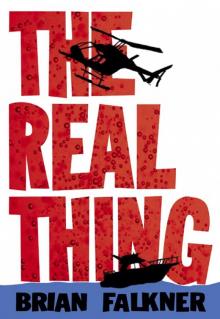 The Real Thing
The Real Thing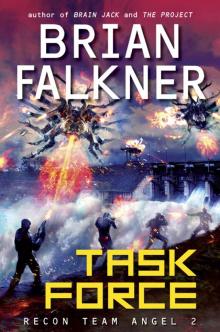 Task Force
Task Force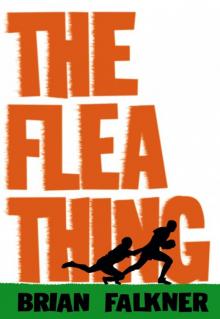 The Flea Thing
The Flea Thing The Project
The Project Clash of Empires
Clash of Empires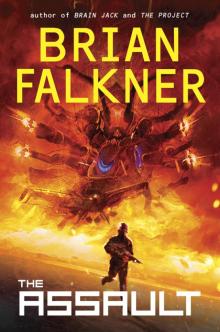 The Assault
The Assault Brain Jack
Brain Jack The Tomorrow Code
The Tomorrow Code Vengeance
Vengeance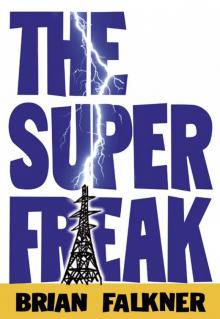 The Super Freak
The Super Freak Northwood
Northwood Cave Dogs (Pachacuta Book 1)
Cave Dogs (Pachacuta Book 1) Maddy West and the Tongue Taker
Maddy West and the Tongue Taker